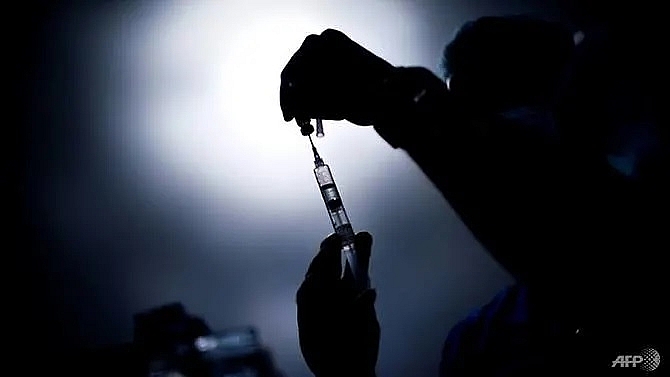Italy court rules assisted suicide not always a crime
 |
| Anyone who "facilitates the suicidal intention" of a patient on life support who is also "suffering from an irreversible pathology" should not be punished under certain conditions, Italy's top court ruled. (AFP/Brendan SMIALOWSKI) |
Parliament is now expected to debate the matter, which was highlighted by the Milan trial of an activist who helped a tetraplegic man die in Switzerland.
Anyone who "facilitates the suicidal intention ... of a patient kept alive by life-support treatments and suffering from an irreversible pathology" should not be punished under certain conditions, the top court ruled.
The court was asked to weigh in on the case of Fabiano Antoniani, known as DJ Fabo, a music producer, traveller and motocross driver left tetraplegic and blind by a 2014 traffic accident.
Marco Cappato, a member of Italy's Radical Party, drove Antoniani to Switzerland in February 2017 where he was helped to die, aged 40.
Helping or instigating someone's suicide is currently punishable by between five and 12 years in prison in Italy.
'MORE FREE'
Cappato hailed the ruling in a tweet: "Those who are in Fabo's condition have the right to be helped. From today we are all more free, even those who disagree. It is a victory of civil disobedience, while the (political) parties turned their heads away".
The Italian Episcopal Conference expressed their "discontent and distance" from the court's decision, quoting Pope Francis who on Friday spoke out against assisted suicide and euthanasia.
"We can and we must reject the temptation, which is also favoured by legislative changes, to use medicine to satisfy a sick person's possible wish to die," the pope said.
The Italian bishops asked for lawmakers to "recognise these values" when debating the matter.
Beppino Englaro, the father of Eluana, who in 2008 was at the centre of a court battle to end her life in a vegetative state, hailed Cappato as "a pioneer who opened the way to establishing a right.".
The court said that a patient's condition must be "causing physical and psychological suffering that he or she considers intolerable."
Following approval of the decision by a local ethical committee, public health authorities should verify all conditions are met.
'CONSCIENTIOUS OBJECTION'
The head of the powerful Catholic Doctors Association (AMCI), Filippo Boscia, announced the "conscientious objection" of its members and slammed "a slide towards euthanasia and a violation of our professional code".
Italy's Coscioni Association said that more than 800 Italians had said on their "SOS Euthanasia" website that they would like to die through assisted suicide.
Far-right leader Matteo Salvini, who strives to appeal to Catholic voters and frequently kisses his rosary at rallies, said he was "opposed to state-sponsored suicide imposed by the law".
Left-wing MP Nicola Fratoianni tweeted: "After the ruling, there are no more alibis: parliament should be capable of making a law of freedom for those who ask for self-determination and dignity for their lives."
The court had since Tuesday been re-examining the question of legalising assisted suicide after it gave parliament last October a one-year deadline to fill a legal void on the thorny issue, but MPs have not done so.
DYING 'WITHOUT SUFFERING'
"The current legal framework concerning the end of life deprives specific situations ... of adequate protection," the court wrote last year.
Cappato turned himself in to Italian authorities after his "act of civil disobedience" to highlight what he saw as an unjust law.
He pointed out that assisted suicide was reserved for those with the physical and financial means to travel to Switzerland, where it is legal.
"I feel like I'm in a cage. I would like to choose to die without suffering," Antoniani wrote to Italian President Sergio Mattarella before his death in Switzerland.
A Milan court is trying Cappato on the charge of "instigating or assisting suicide", but asked the Constitutional Court to clarify the current law. He is likely to be acquitted following the Constitutional Court's decision.
What the stars mean:
★ Poor ★ ★ Promising ★★★ Good ★★★★ Very good ★★★★★ Exceptional
Related Contents
Latest News
More News
- Russian President congratulates Vietnamese Party leader during phone talks (January 25, 2026 | 09:58)
- Worldwide congratulations underscore confidence in Vietnam’s 14th Party Congress (January 23, 2026 | 09:02)
- Political parties, organisations, int’l friends send congratulations to 14th National Party Congress (January 22, 2026 | 09:33)
- 14th National Party Congress: Japanese media highlight Vietnam’s growth targets (January 21, 2026 | 09:46)
- 14th National Party Congress: Driving force for Vietnam to continue renewal, innovation, breakthroughs (January 21, 2026 | 09:42)
- Vietnam remains spiritual support for progressive forces: Colombian party leader (January 21, 2026 | 08:00)
- Int'l media provides large coverage of 14th National Party Congress's first working day (January 20, 2026 | 09:09)
- Vietnamese firms win top honours at ASEAN Digital Awards (January 16, 2026 | 16:45)
- ASEAN Digital Ministers' Meeting opens in Hanoi (January 15, 2026 | 15:33)
- ASEAN economies move up the global chip value chain (December 09, 2025 | 13:32)

 Tag:
Tag:




















 Mobile Version
Mobile Version